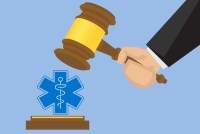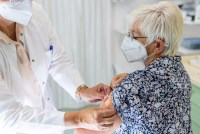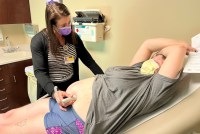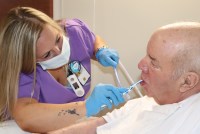Latest KFF Health News Stories
Conservative Blocs Unleash Litigation to Curb Public Health Powers
Spurred on by opposition to pandemic-related health mandates, a coalition of religious liberty groups, conservative think tanks, and Republican state attorneys general has filed a cascade of litigation seeking to rein in the powers of public health authorities.
Boost Now or Wait? Many Wonder How Best to Ride Out Covid’s Next Wave
As the country faces a rise in new infections driven by the omicron BA.5 subvariant of the coronavirus, about 70% of people 50 and older who got a first covid-19 booster shot haven’t received the recommended second one, according to the Centers for Disease Control and Prevention. Many undervaccinated Americans have lost interest, and others aren’t sure whether to get boosted again now or wait for vaccines reformulated to target newer strains of the virus.
Nurse Midwives Step Up to Provide Prenatal Care After Two Rural Hospitals Shutter Birthing Centers
Dozens of Iowa hospitals have closed their birthing units. A team of University of Iowa nurse midwives can’t reopen them, but they’ve found a way to provide prenatal checkups and other crucial services in two towns.
As Big Pharma Loses Interest in New Antibiotics, Infections Are Only Growing Stronger
Existing drugs still treat most infections. But that has discouraged investment in new drugs that will be needed when — not if —the old ones fail.
California’s Public Health Tax Is Dead for the Year
A ballot measure that would have taxed California millionaires to boost public health funding will not be on the November ballot. But the tech titans who bankrolled the effort say they are negotiating with Gov. Gavin Newsom’s administration to get more money without imposing new taxes.
KHN’s ‘What the Health?’: Life After ‘Roe’ Is … Confusing
A rapidly changing landscape for abortion has left patients, providers, employers, and lawmakers alike wondering what is and is not legal and what to do next. Meanwhile, Democrats in Congress have resumed negotiations on legislation to lower drug prices and, potentially, continue expanded insurance subsidies for the Affordable Care Act. Alice Miranda Ollstein of Politico, Tami Luhby of CNN, and Sandhya Raman of CQ Roll Call join KHN’s Julie Rovner to discuss these issues and more. Plus, for extra credit, the panelists recommend their favorite health policy stories of the week they think you should read, too.
‘American Diagnosis’: A Tribal Court in California Works to Heal Family Separation
Indigenous people in the United States face disproportionately high rates of incarceration and family separation through the foster care system. Episode 8 explores the Yurok Tribal Court’s efforts to keep families together.
Kids Want to Put Montana on Trial for Unhealthy Climate Policies
Sixteen children and young adults are suing the state over energy policies they say are hurting their health and environment. The flooding that closed Yellowstone National Park may show they have a point.
Rural Hospital Rescue Program Is Met With Skepticism From Administrators
A new federal rescue program that pays rural hospitals to shutter underused inpatient units and focus solely on emergency rooms and outpatient care hasn’t generated much interest yet.
Patients With Epilepsy Navigate Murky Unregulated CBD Industry
The FDA has approved a cannabis-derived drug, Epidiolex, to treat some forms of epilepsy. Now people who have other forms of the condition are using over-the-counter CBD products in hopes of taming their seizures. But doctors and patients worry about the unregulated world of CBD, in which product ingredients can be a mystery.
Hospital-Acquired Pneumonia Is Killing Patients. Yet There Is a Simple Way to Stop It.
Hospital-acquired pneumonia not tied to ventilators is one of the most common infections that strike within health care facilities. But few hospitals take steps to prevent it, which can be as simple as dutifully brushing patients’ teeth.
Self-Managed Abortions Gain Attention, but Helpers Risk Legal Trouble
A network of organizations help women use medication to end early pregnancies safely. But it’s a legal gray area in Tennessee and other states that restrict abortion.
‘An Arm and a Leg’: One ER Doctor Grapples With the Inequities of American Health Care
This episode is an interview with Dr. Thomas Fisher, author of “The Emergency: A Year of Healing and Heartbreak in a Chicago ER.”
Las medidas de Colorado no sirven para frenar los altos niveles de ozono peligrosos para la salud
El ozono se crea cuando las sustancias químicas que se emiten a la atmósfera a través de los tubos de escape de los vehículos, la explotación de petróleo y gas y los incendios forestales se calientan con el sol. La contaminación por ozono es un problema persistente en la región.
Colorado’s Efforts Are Not Enough to Solve Its Ozone Problem
Some health experts said measures underway by state and federal officials won’t lower ozone pollution to safe levels across nine counties of Colorado’s Front Range.
A 63-Year-Old Transgender Woman Is Caught in Montana’s Birth Certificate Dispute
Montana is one of a handful of states that bar transgender people from changing the sex on their birth certificates. Health professionals say that gender marker should be erased completely.
Medi-Cal’s Reliance on Prisoners to Make Cheaper Eyeglasses Proves Shortsighted
In California, where inmates manufacture glasses for Medi-Cal, enrollees and providers can wait months for their orders. Now, state lawmakers are considering allowing clinics to order from private labs as well.
In America, Cancer Patients Endure Debt on Top of Disease
Medical breakthroughs mean cancer is less likely to kill, but survival can come at an extraordinary cost as patients drain savings, declare bankruptcy, or lose their homes, a KHN-NPR investigation finds.
The Search for Scarce Formula Is Worse for Rural Families on WIC
Constraints imposed by the Special Supplemental Nutrition Assistance Program for Women, Infants, and Children, known as WIC, that prevent recipients from using benefits to buy formula across state lines weigh on families as the nationwide formula shortage drags on.
The Push for Abortion Lawmaking After ‘Dobbs’ Is Unique, Legal and Political Experts Say
The surge of calls for special legislative sessions to pass abortion laws is an unusual occurrence in modern U.S. history, according to experts — one caused by the Supreme Court’s decision to give states more power to regulate abortion.

























